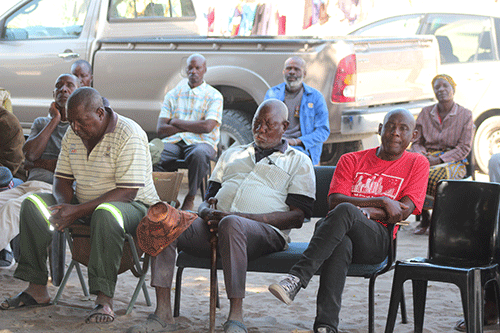Kabbe – The community of Kabbe North constituency in the Zambezi region has appealed to the government to introduce a policy to cull problem animals such as crocodiles and hippos whose population has rapidly increased in the area.
Residents of the area, whose livelihood depends on riverine resources, made this appeal during a public hearing held on 8 August by the Parliamentary Standing Committee on Natural Resources, which was visiting the region to hear the views of community members on the pressing issue of human-wildlife conflict.
The hearings follow a motion on the issue, which was recently tabled in the National Assembly and referred to the committee for further enquiry.
According to community members, the growing populations of people and wild animals in the area has resulted in increased cases of human-wildlife conflict due to competing interests.
One of the community
members, retired educationist Alfred Ilukena said the concept of conservation has been misconstrued to mean tourism, which has allowed populations of trouble animals to multiply.
“The population of humans
and animals is expanding but the land size remains the same.
As a result, we have competing interests in the same
environment. If we want to live in harmony with wildlife, we have to control their numbers particularly the crocodiles and hippos that we have in abundance in this region and are causing us problems.
The ministry should come up with a policy that allows the
annual harvesting of crocodiles that have drastically increased in our rivers,” suggested Ilukena.
According to the residents, crocodiles that can lay on average between 30 to 60 eggs per nest, are responsible for the deaths of people and livestock in the area as food becomes scarce in the rivers due to their increasing numbers.
Ilukena further said even though Namibia was a signatory to conventions that call for the protection of endangered species including pressure from international organisations, deliberate efforts should be made to protect the communities
who directly face the dangers associated with such problem animals.
“Seals are being culled due to the threat they pose to our fisheries resources, why not do the same with other problem animals whose populations are increasing uncontrollably? International organisations are not here in our villages to see how people are suffering. How can they dictate how we should manage our resources? Let’s be bold enough and introduce a policy,” implored Ilukena.
Deputy chairperson of the parliamentary committee and leader of delegation Agnes Kafula concurred with the sentiments, accusing international organisations of valuing wildlife more than humans.
“When we lose a person due to human-wildlife conflict, we do not get any support from these so-called organisations that are claiming to be helping us conserve our natural resources,” she said.
Another MP Tangeni Iijambo suggested that the community
be allowed to initiate a crocodile farm that can generate revenue to develop the area and create jobs. “We have the Kongola crocodile project initiative which has come to a standstill and is now a white elephant. This project could have helped to harvest some of these crocodiles for commercial purposes. In fact, due to their increasing numbers in the area of Kabbe, the community can also be allowed to set up a crocodile farm,” he suggested.
Another resident welcomed the idea of creating conservancies to allow communities to manage their own recourses but noted that there was no awareness created of some of the challenges associated with these initiatives at the time of inception.
He stated that the translocation and free-roaming of problem animals such as hyenas into conservancies has resulted in major losses for many farmers due to this lack of awareness. To exacerbate matters, community members complained that compensation
for losses was too little and payment is often delayed.
It also became apparent that compensation is limited to crops damaged only by three problem animals – elephants, buffaloes and hippos. It was further revealed during the meeting that community members residing outside of conservancies were not eligible to claim for compensation from the conservancy management fund meant to assist residents who suffer losses due to human-wildlife conflict. According to chief warden of Wildlife and National Park Management in the environment ministry Maani Matomola, such claimants can only be assisted by the ministry after investigations have determined whether they qualify to be compensated or not and if the budget allows for such compensation.
Residents suggested that the government sets up a dedicated fund for farmers residing outside conservancies to avoid delays and the constant non-availability of compensation funds.
Kafula concurred, adding that it appeared consultations were not thoroughly conducted during the initial stages of the revised compensation policy as it has continuously failed to address the concerns of the communities.
Meanwhile, community members of Nakabolelwa in the Kabbe south constituency called for increasing the harvesting of problem animals such as crocodiles. They stated the conservancy was only granted a hunting quota of two crocodiles despite the
reptiles having increased tremendously. Other suggestions included the erection of crocodile fences and the provision of more boreholes and water troughs to minimize conflict as both animals and humans rely on the river for their livelihood.
The committee was scheduled to also meet community members in the Lintanti, Judea Lyabboloma, Sibbinda and Kongola constituencies.
Mike Venaani and Annakletha Sikerete are the other members of the parliamentary committee.
*George Sanzila works for the National Assembly in the Division: Research, Information, Publications and Editorial Services.


